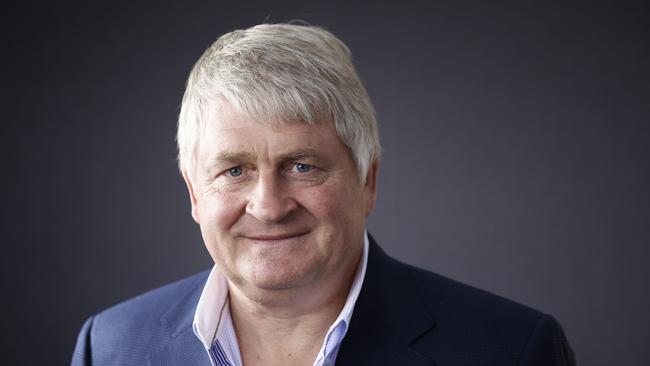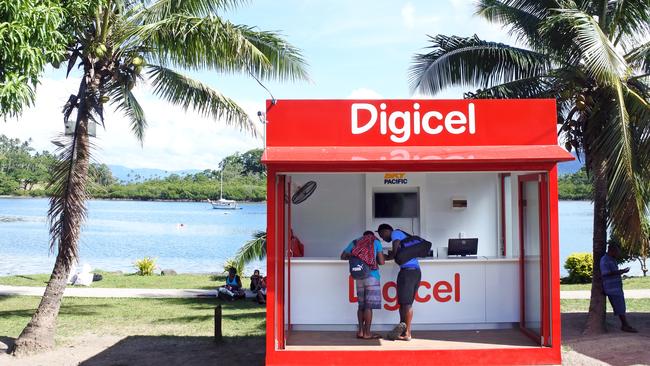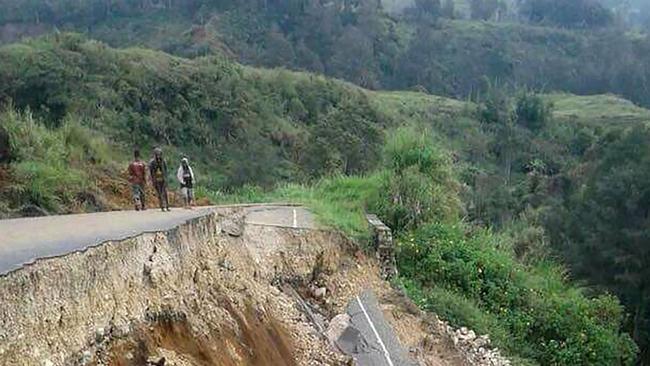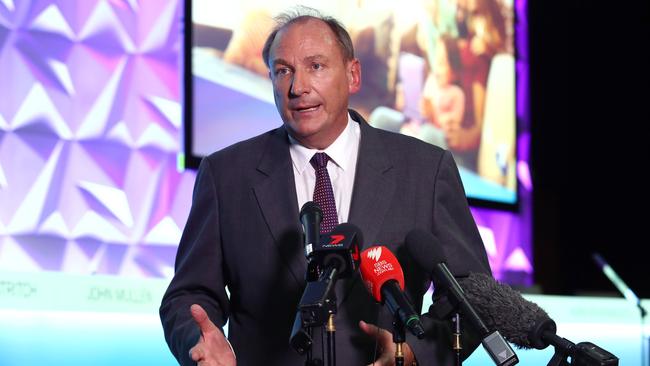Telstra target Digicel grew a ‘hearts and minds’ strategy alongside its mobile networks
Digicel Pacific is more than just a strategic asset being fought over by foreign powers, it’s a key plank of economic development.

While investors in Australia this week debated the financial and strategic imperatives behind a somewhat unusual Canberra-backed deal for Telstra to buy Digicel Pacific, the parent company’s “chief speed officer” Usain Bolt was hard at work judging the Jamaican national baby trials.
While the first many of us knew of Digicel came in the form of a brief, even terse, release to the ASX on Monday, in which Telstra admitted that – at the behest of the federal government – it was looking at potentially buying out the pacific regional arm of the business, it’s a hugely popular brand in many of the more than 30 markets it operates in.
For people in the Caribbean, Digicel means Usain Bolt – the world’s fastest man over 100m who they’ve sponsored since he was 16 years old – it means the West Indies cricket team; in the Pacific it means rugby.

In Haiti it means the building of more than 150 schools, and more than 680 classrooms and 100 community learning centres in PNG, as well as a massive expansion of mobile coverage in what was previously an under-served market.
Its technology has become a way to share wealth, a form of currency in some areas.
And in Ireland, it’s part of the global empire of its richest locally-born citizen Denis O’Brien, former protege of Ryannair founder Tony Ryan, one-time media mogul, entrepreneur and football benefactor.
Mr O’Brien, who founded Digicel in 2001 using cash from the takeover of his NASDAQ-listed Esat Telecom to build a wireless network in Jamaica, is now on the cusp of another potential payday, worth a rumoured $2 billion, as the Australian government supposedly moves to block China’s telecommunications ascendence in the Pacific.
Whether a buyout of Digicel Pacific can even achieve this is arguable.
PNG and Pacific expert and a contributing author to the Australian Strategic Policy Institute Jeffrey Wall says it won’t – China can just compete on the ground – but he does argue that there are good reasons for Australia to have skin in the pacific telco game.
But a bidding war, justified or otherwise, can’t help but be to Mr O’Brien’s advantage.
The company fell into bankruptcy in May last year with debts of $US7.4bn and operating profit of just $US479m. An SEC filing at the time said “the group finds itself with unsustainable volumes of funded indebtedness’’.
The Digicel Pacific division, which Telstra says generated EBITDA of $US235m in 2020, is among the best performing parts of the business, and was offered as security for $US941m in secured notes as part of the bankruptcy restructure according to a Reuters report.
It operates across PNG, Fiji, Nauru, Samoa, Tonga and Vanuatu, and is the number one carrier in almost all of those markets, with more than 90 per cent market share in PNG.
But the valuation put on the business at that time by KPMG was just $US615.2m in a best-case scenario and $US493.9m at the low end.
Reported interest from China Mobile in Digicel Pacific last year quoted a possible buyout figure of $US900m.
So if the rumoured figure of $2bn is on the money, being a pawn in the communications cold war in the Pacific could be exactly where Mr O’Brien, understood to be directly involved in any potential transaction, wants to be.
Digicel’s strategy, since its inception in 2001, has been unashamedly “hearts and minds”.
The company has gone into markets ignored by its bigger rivals, often dominated by sovereign competitors and on the cusp of opening up to competition, where doing business was difficult, and where the infrastructure was poor.
In Jamaica, where the company picked up one of two mobile licences for $US41m when they first hit the market in 2001, the timing was serendipitous.
With the incumbent telco itself in the process of bringing users over to what were then GSM mobile networks, the entire market was effectively in play.
Digicel found itself in the right place at the right time, and has repeated that model across several emerging markets.
In PNG, where Digicel entered when the market was liberalised in 2007, market penetration was minuscule at the time.
The Asian Development Bank, which ponied up a $US18m loan in 2009 to help the company roll out across PNG, estimated that mobile penetration in 2007 was just 3 per cent.
Largely as a result of Digicel’s entry into the market, and an aggressive rollout of mobile towers, this increased to 21 per cent by 2009, and the company now claims a more than 90 per cent market share.
It says it has spent more than $US1.2bn across the region since it launched, with more than $US300m of this in the past five years.
The Digicel rollout across PNG – more than 950 towers – has come with economic benefits, and a key role in civil society for the provider.
“The liberalisation in the mobile telecom sector resulted in significant sector growth and created spillover effects in social and economic development in PNG,’’ the ADB says in its report on the loan.
“The key driving force is the private sector initiative of the borrower that has led the sector revolution to date. The knowledge transferred by the Digicel group has benefited the telecom sector in PNG, which in turn has helped the nation to overcome infrastructure rollout challenges.’’
This fits with O’Brien’s avowed philosophy, espoused in a 2013 interview with The Washington post.
In that article, a tale is recounted of Mr O’Brien hiking the Kokoda Track, and finding to his dismay that he was without mobile coverage.
He stormed into the local offices of Digicel and demanded that extra phone towers be built along the route, the story goes.

Hikers on the track would attest that blanket coverage certainly hasn’t yet arrived, but through its Digicel Foundation, if the company is to be taken at its word, it has disbursed more than $US40m in PNG alone.
The company runs charitable foundations in Jamaica, Haiti, PNG and Trinidad and Tobago, independent from its commercial arms, with the “sole purpose of building communities and community spirit.’’
As Mr O’Brien told the Washington Post: “You fix their telecommunications requirement, but then you fix something else as well. You can’t just leave it to NGOs and charities.”
The ADB report certainly indicates that Digicel’s efforts to win over the communities in which it operates were working when it was penned.
“The brand is renowned for its customer satisfaction strategy and its community support initiatives through the Digicel Foundations,’’ the report says.
From an Australian perspective, rumblings about Digicel being in play started in the middle of last year, when a consortium including Morgan Stanley and Pacific Equity Partners started kicking the tyres.
Soon after, the federal government engaged Macquarie Capital to advise it, with early stage talks taking place late last year, which did not go anywhere at the time.
Rumours have swirled since then about supposed Chinese interest in buying Digicel Pacific, with the aforementioned China Mobile denying any interest, and the theme of the Australian government getting involved in a bid to stymie Chinese influence in the area emerging.

Western governments are arguably concerned about Chinese influence in the Pacific, as evidenced by Australia bankrolling the Coral Sea Cable System, a 4700km network connecting Australia to the Solomons and PNG, which was in part built to shut-out a competing proposal from China’s Huawei technologies.
The Pacific Island of Nauru recently rejected a Chinese proposal to build its own sub-sea cable to connect to Australia’s network, and reportedly has approached the ADB for help to fund it.
But back in PNG, China has already built the nation’s data centre, and some, such as PNG expert and Australian Strategic Policy Institute contributing author Jeffrey Wall argue that buying Digicel won’t stop China from spying.
“I don’t think that would in any way stop the Chinese at all. They are already there,’’ Mr Wall said.
And he told The Weekend Australian this week, that China may simply be goading Australia into paying a higher price for the asset.
“It may be that the Chinese are smart enough to say ‘if we just put our foot in the water, Australia will panic and will have to spend more money to buy it’.’’
Mr Wall does argue that Australian ownership of the major telco in the region would give the nation significant influence however, and build goodwill following major business such as ANZ pulling out of the nation in recent years.
Mr Wall also argues that if China wanted to, it could simply compete with Digicel.
This is an arguable point, and germane to Telstra’s potential interest in the transaction.
PNG is a hard place to do business in – both physically and from a bureaucratic standpoint.
Digicel’s well-established mobile network, and the fact that its mobile businesses, and also its business services and broadcast businesses are deeply embedded in the community, arguably gives it a very strong economic moat.

A source told The Australian earlier this week that maintaining the network was a huge job.
“It’s a full-time job. Landowners steal the solar panels, they run the security at each site. Yes they’ve got great coverage, but it is so much hard work.”
But that hard work is all ahead of a potential competitor, at least in PNG.
From Telstra’s point of view, as a listed company, there are potentially significant corporate governance issues which arise from any transaction backed by the government, which chairman John Mullen tackled head-on this week.
Speaking at an Australian Council of Superannuation Investors (ACSI) conference on Wednesday, he said while the Digicel deal would probably not have been on Telstra’s radar without the government’s involvement, any deal had to stack up financially.
“Obviously I’m pretty limited as to what I can say but what I can say is that Telstra will not be making any investment that doesn’t make sense for its shareholders and deliver adequate financial returns,’’ Mr Mullen said.
“That’s not just a platitude, it’s an absolute fact. We will not enter into any transaction that isn’t financially accretive.

“That said, can you help your sovereign government in current times, particularly if you’re a critical infrastructure provider? Of course you can. The key is to try and find a balance between the two.’’
You would have to imagine this week’s revelations have not gone unnoticed in the major boardrooms around the nation however, with our large mining and logistics companies within their rights to wonder who will next be tapped on the shoulder to do their patriotic duty.
As for Mr O’Brien, he’s currently not talking, at least publicly.
What can be surmised with a large degree of confidence, is that he’s deeply involved in the process.
The University College Dublin and Boston College graduate is known as a hands-on business leader, closely involved in the day to day workings of his ventures.
If the sale comes off it will perhaps be a salve for 63-year-old Mr O’Brien, who looked at taking the company public back in 2015, pulling the IPO citing “current conditions, particularly in emerging markets.”
Mr O’Brien was rumoured to be in line for $US2bn from that deal.
And while $2bn Australian is a bit shy of that mark, it would add nicely to the reported $US6.8bn fortune he has already amassed.




To join the conversation, please log in. Don't have an account? Register
Join the conversation, you are commenting as Logout